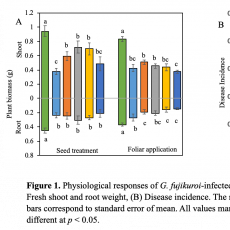
Bakanae disease, caused by Gibberella fujikuroi, is one of the most important seedborne fungal diseases of rice. The infected rice seeds by G. fujikuroi show severe reductions in germination and growth rate, resulting in considerable yield losses in rice-growing regions worldwide. This projects seeks to develop and synthesize nanoparticles (NPs) to minimize the infection of G. fujikuroi and control rice bakanae disease and evaluate the efficacy and mode of action of the newly developed NPs. A better understanding of antimicrobial activities of NPs will promote effective and economical use of the NPs as a potential fungicide in agricultural production.
This summer, I reviewed published research papers about the plant response to engineered nanoparticles. I had a new topic each week to focus my research on different fields. My reviews sometimes focused on the effect of copper-based nanoparticles on soil property and plant function, the role of root exudates in plant-pathogen interaction, Fusarium wilt of lettuce (pathogen: Fusarium oxysporum), Bakanae disease of rice (pathogen: Gibberella fujikuroi), etc. Each time I did my review, I summarized the information I read from the published research paper into different columns. For example, I have columns about types of nanoparticles, application concentration, application method, host and disease, research result, phytotoxicity to the host, website link to the research, and other extra information that I want to add. The information I summarized will help better understand how NPs reduce the plant disease of rice and mitigate Fusarium oxysporum and Gibberella fujikuroi infections to plants. Furthermore, the knowledge gained from the planned activities will benefit the effective and safe uses of NPs and nanotechnology in agriculture and provide a valuable database to guide sustainable development of nanotechnology.
Before I had this internship, I always had an interest in the nanotechnology field because we might use this new technology to increase food production and solve the hunger issue that our world is facing right now. During this summer, I read many published articles about the effect of engineered nanoparticles on plants, and I got to know more about the function of different types of nanoparticles. Some nanoparticles can help the plant defend against certain diseases and raise the production rate; however, these nanoparticle concentrations are significant. We need to set up experiments to test the ideal concentration to apply because a higher concentration of the nanoparticles could have killed the plants or made the disease even worse. In addition to that, I also had a chance to analyze the data I collected from an economic perspective. I believe this internship has helped me get to know more possibilities of the nanotechnology field and various nanoparticles. After this internship, I can declare which area I want to focus on and I can set a goal for myself.
